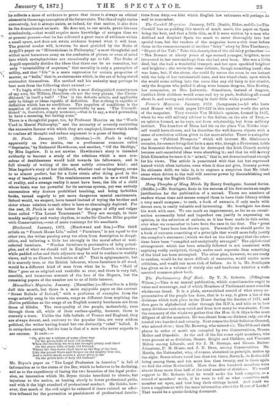"Street Ballads of Ireland," with a profusion of examples from
the songs actually sung in the streets, songs as different from anything the Nation publishes as the songs of an English country beerhouse are from those of Dibdin. The root-quality of the people, melancholy, runs through them all, while of their surface-quality, humour, there is scarcely a trace. Unlike the folk-ballads of France and England, they are always decent, and, contrary to the popular idea, are very seldom political, the writer having found but one distinctly "rebel" ballad. It is outspoken enough, but its tone is that of a man who never expects to see success. It ends :— " Oh, give me a tribute of some silent tear
On the green hills of holy old Ireland, When the freedom we won has brought plenty and cheer On the green hills of holy old Ireland,
Where the Sun-burst shall wave as the flag of the free, Like the proud Stars and Stripes on the mighty blue sea., And a newly-made nation a grave gives to me On the green hills of holy old Ireland:" Mr. Bryce's paper on "The Legal Profession in America" is full of information as to the status of the Bar, which he believes to be declining, and as to the expediency of fusing the two branches of the legal profes- sion, an innovation which Mr. Bryce thinks beneficial to clients, but injurious to the nation, as leading slowly to lower professional pride, and with it the high standard of professional conduct. He thinks, how- ever, that mach of the evil might be reduced if there existed an effec- tive tribunal for the prevention or punishment of professional dorelic-
tions from duty,—a hint which English law reformers will perhaps do well to remember.










































 Previous page
Previous page